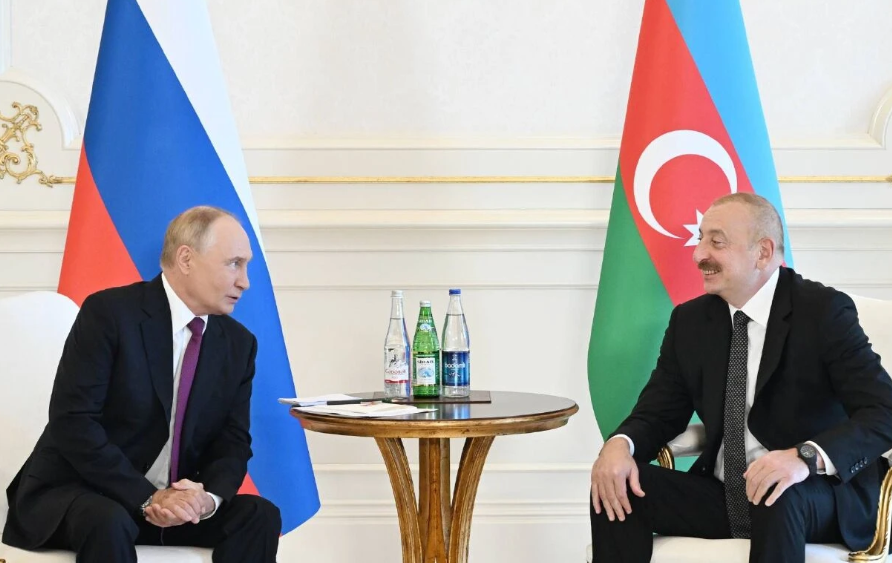Azerbaijani deaths in Yekaterinburg reignite tensions between Baku and Moscow
After the incident involving a plane carrying 67 people that crashed in December due to “interference” with the war in Ukraine, Azerbaijan and Russia are once again in the midst of a diplomatic crisis over a police raid. In the background is the crisis of Russian influence in the Caucasus, increasingly overshadowed by Turkish activism in the region.
Baku (AsiaNews) - In addition to rejecting a peace solution with Ukraine, despite proposals for negotiations from the United States and Ukraine itself, Russia is complicating its life with its stubbornness in creating further problems for itself in the Caucasus, with growing tensions with Azerbaijan, a crucial state for the balance of the region, in a series of events that have provoked increasingly irritated reactions from Baku.
As US politician Zbigniew Brzezinski said, “without an independent Azerbaijan, it is very difficult to maintain and develop the independence of the whole of Central Asia”, while Moscow is still trying to impose itself as in Soviet times, despite the long struggle of the Azerbaijanis to free themselves from Russian chains.
In recent days, there have been several statements of support for Azerbaijan from Central Asian countries, starting with the presidents of Kazakhstan and Uzbekistan, the latter on an official visit to Baku.
The problems began on 24 December last year, when an Azerbaijan Airlines plane crashed in Aktau in western Kazakhstan with 67 people on board, 38 of whom died, with clear Russian culpability in interfering with air traffic due to military action against Ukraine, while the Embraer 190 was heading for Grozny, the capital of the Russian republic of Chechnya.
The Russians tried to justify themselves by pointing to “collusion with birds”, but the Kazakh investigation into the violation of air traffic and safety regulations highlighted Moscow's responsibility, which refused to admit its guilt.
After months of tense relations, relations between the two countries have dramatically deteriorated in what appears to be, to all intents and purposes, the biggest diplomatic crisis between Moscow and Baku, until recently “strategic partners” and, above all, economic partners.
On 27 June, in the Russian city of Yekaterinburg in the Urals, during a police raid against criminal gangs, two Azerbaijani citizens with Russian passports were killed in circumstances that remain unclear, and a third man, the brother of the two killed, is still in intensive care.
In Azerbaijan, several Russian citizens were arrested in retaliation, and all cultural and social relations with Russians in the country were suspended after the closure of the Russkij Dom centre and the local branch of the Sputnik news agency.
Against the backdrop of the Russian-Azerbaijani conflict, the possibility of reaching a peace agreement between Azerbaijan and Armenia is at stake in the Caucasus, and Russia would end up being completely excluded from these negotiations, which it has attempted to lead in various ways, ending up increasingly distanced from both Baku and Yerevan.
This situation is of great concern to the Russians, who would lose all control over the region and risk increasing problems in Russian areas of the North Caucasus, such as the Caspian region of Astrakhan, where there is a large ethnic Azerbaijani minority.
In addition to direct Russian-Azerbaijani relations, Turkey's activism has a major impact on the regional balance, as it presents itself as the sole mediator in the entire area, even attracting the favour of the Armenians, overcoming the historical controversies over last century's genocide.
The family of Turkic-speaking peoples stretches from Asia to the Balkan territories of Bosnia-Herzegovina, and Azerbaijan is a central hub in this ethno-cultural union, which is becoming increasingly significant at the expense of the Russians.
Turkish President Recep Tayyip Erdogan is sparing no effort or financial resources to return to the glories of the Ottoman Empire, relying primarily on Azerbaijani leader Ilham Aliev in the process of “mutual integration” between Turkey and Azerbaijan.
In 2024, Azerbaijan extracted 24 million tonnes of oil and approximately 24 billion cubic metres of natural gas, which reached commercial destinations via Georgia and Turkey, under the increasingly angry and impotent gaze of Russia and the more benevolent gaze of China, which is ready to exploit these situations to its own advantage.
12/02/2016 15:14







.png)










